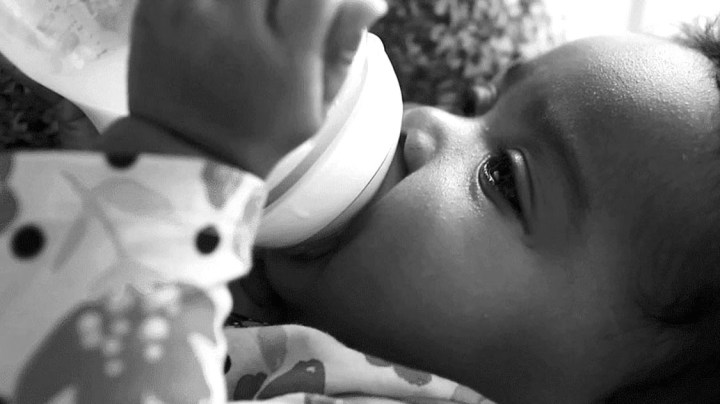Maverick Citizen Op-Ed
Donations of free infant formula – threatening a crisis on its own

Since the escalating unrest and violence over the past week there have been calls for food support to KZN and parts of Gauteng, many of them for infant formula.
Chantell Witten is University of the Free State and Nutrition Lead for the Civil Society for Women’s, Adolescents’ and Children’s Health (SACSoWACH); Wiedaad Slemming is University of the Witwatersrand and ECD Lead for the Civil Society for SACSoWACH; Maria van der Merwe, Dietitian and President of the Association for Dietetics in South Africa; Baheya Najaar, from the University of Cape Town and a volunteer with Gift of the Givers.
The unrest and violence in parts of KwaZulu-Natal and Gauteng have had devastating impacts on infrastructure and food stocks, and disrupted the delivery of goods and services. While the President, in his address on Sunday, 12 July 2021, hinted at the possible risk to food security, no one would have anticipated the unprecedented looting and shutdown of parts of KZN. As news of looting and the destruction of shops spread, panic buying and stockpiling compounded the existing problem of low food stocks.
Since the escalating unrest and violence over the past week there have been calls for food support to KZN and parts of Gauteng, many of them for infant formula.
Globally, mothers are advised to exclusively breastfeed for an infant’s first six months to achieve optimal growth, development and health. Thereafter they should be given nutritious complementary foods and continue breastfeeding up to two years or older. In South Africa these recommendations have been adopted regardless of the mother’s HIV-status. All pregnant women who test positive are entitled to lifelong antiretroviral treatment.
Despite these recommendations, and the numerous maternal and child health interventions to improve optimal young-child feeding, South Africa has a low breastfeeding rate, while mixed feeding is the norm for young infants. Based on the findings of the 2016 national Demographic and Health Survey, one in four children under six months is exclusively formula-fed, while one in three in the same age group are exclusively breastfed. This means the remaining 43% of children under six months receive some breastfeeding in addition to other fluids and foods. Furthermore, 50% of children under 24 months are still breastfed.
Given the evidence and in line with national and global recommendations, it would be in the interest of child health and development for all of society to protect, promote and support breastfeeding, especially when the food supply chain cannot guarantee continuous infant formula stocks.
Children under the age of six months are at greatest risk of poor infant feeding. The evidence is clear that not breastfeeding at all carries the highest risk for infant mortality. The impact of poor formula feeding was tragically best illustrated during the height of HIV. Infants who did not breastfeed had higher mortality rates than those who were mixed-fed (breastfeeding and infant formula), illustrating that any breast milk still offered some protection through its anti-infective properties and higher nutrient density.
In 2011, the Department of Health through the then minister, Dr Aaron Motsoaledi, declared South Africa a breastfeeding country and began phasing out free infant formula from the prevention of mother-to-child transmission of HIV programme. South Africa committed to scale up the mother-baby friendly initiative to all public-sector health facilities providing maternity services and to put in place regulations to control the marketing of infant formula in line with the International Code of Marketing of Breastmilk Substitutes.
In December 2012, South Africa gazetted the Regulations Relating to Foodstuffs for Infants and Young Children (R991). South Africa reported a five-fold increase in exclusive breastfeeding rates from 8% in 2003 to 32% in 2016, which it attributed to these initiatives.
At the forefront of scaling up the mother-baby friendly initiative in all public health facilities and setting up human-milk banks at district hospitals, KwaZulu-Natal launched a breastfeeding campaign and established breastfeeding advisers at primary healthcare facilities. These are community caregivers with additional training and skills in breastfeeding counselling and support. KwaZulu-Natal has reaped the benefits of these interventions by reporting that almost 60% of mothers of infants aged 14 weeks exclusively breastfed since birth, and a 50% exclusive breastfeeding rate among infants aged 0 to six months.
Since the gazetting of Regulation R991 – to keep the promotion and advertising of infant formula at bay – South Africa has had relative success in curtailing the role of the formula industry in the infant and young child feeding agenda. This includes action taken by professional associations to not accept sponsorship or funding from this industry – a major achievement given the long-standing history with societies for health professionals, academics and researchers.
These relationships between the industry and health professionals have been under debate since 1996, as published in the World Health Assembly Resolution 49.15 of 1996, which called on governments to ensure that “financial support for professionals working in infant and young child health does not create conflicts of interest, especially with regard to the [World Health Organization and] UNICEF Baby-Friendly Hospital Initiative”.
South Africa has made much progress towards realising child health rights and affording mothers the protection and support to breastfeed. The recent unrest in KZN and Gauteng, and the subsequent rush by civil society to provide free formula as part of relief efforts, threatens to undermine the gains made. It threatens to open the doors and floodgates with the impression that infant formula is an essential food for children. This is contrary to public health evidence, to sustainable food systems and to child health and nutrition rights.
We caution that donations and distribution of free infant formula is a crisis unfolding, especially since sustainable donations of formula cannot be guaranteed as food insecurity and poverty deepen. We urge relief efforts with respect to the distribution of infant formula to be coordinated and managed in a way that protects breastfeeding and avoids the spillover effect to mothers who choose to breastfeed.
We call on relief efforts to assess the needs of infants under six months as a priority, and to approach the La Leche League for peer breastfeeding support, the Association for Dietetics in South Africa, or the Lactation Consultants of Southern Africa to support mothers and to bolster our collective effort to strengthen the breastfeeding culture in South Africa. Distributing free formula is not the only response needed. DM/MC




















Comments - Please login in order to comment.